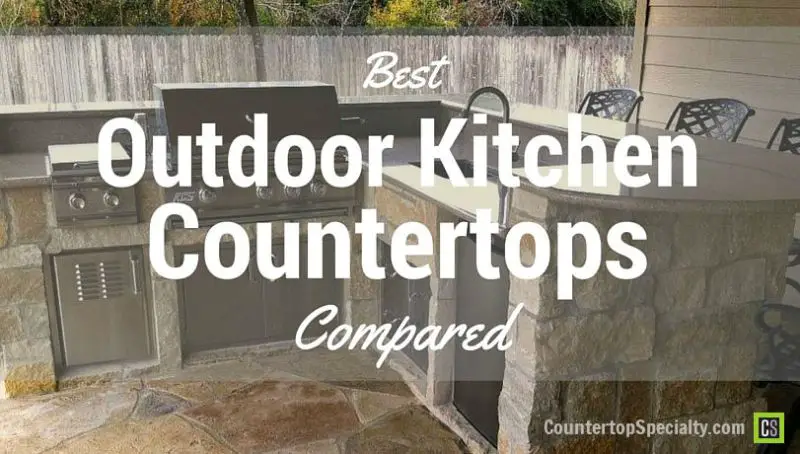Best Outdoor Kitchen Countertops Compared
Choosing the best outdoor kitchen countertops can be challenging given the many types of countertops available and the additional demands of outdoor use. Below we review the top contenders and... a couple to avoid as well.
On This Page
Best Outdoor Kitchen Countertop Ideas
1. Granite Countertops
Granite countertops are tough to beat for all-around ease-of-use, maintenance, color choices, and unmatched durability for outdoor kitchen countertops.
Granite can handle the weather and all the fancy barbecue recipes, food, drinks, fun (and sometimes chaos) of outdoor dining and entertaining.
It won't etch, discolor, or lose its shine. Since it's a porous material sealing granite countertops is a good idea to withstand stains. However, this is not complicated... easily done.
Many varieties are dense enough that you don't need to apply a sealer. If you do stain a granite countertop, it can be removed or the sun and rain will get rid of it over time. With normal clean-up, outdoor granite countertops will look great for years.
Plus granite offers so many color and pattern options you're bound to find at least one that's perfect.
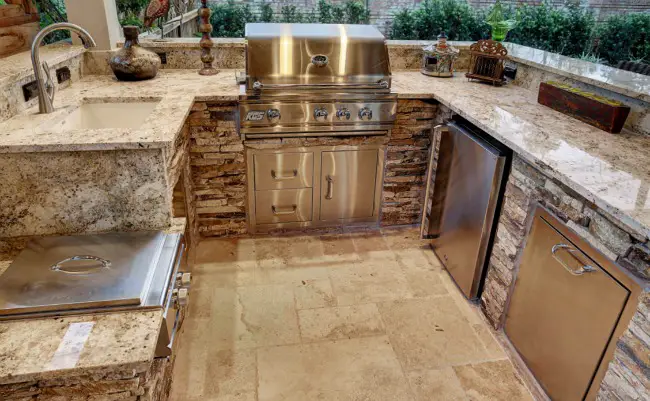 Granite Outdoor Kitchen Countertops | photo: Texas Custom Patios
Granite Outdoor Kitchen Countertops | photo: Texas Custom PatiosIn truth, granite sets the bar for comparing outdoor countertop materials but others can make good outdoor kitchen countertops as well. It's just a matter of weighing the pros and cons and deciding what look or style works with all your other outdoor kitchen design ideas.
Some surfaces perform differently outdoors vs. indoor kitchens regarding durability and maintenance, so you definitely want to consider these factors as we continue.
2. Quartzite Outdoor Countertops
Quartzite will make an excellent countertop for your backyard kitchen. Note we're talking about quartzite... the natural stone.... not "quartz" the engineered stone (which you should read about below).
Quartzite has essentially the same qualities as granite. A quartzite countertop is a hard and durable stone. It will last a long time with little fuss as an outdoor bar countertop.
3. Concrete Outdoor Countertops
Concrete is also a durable material for outdoor kitchen countertops. Concrete countertops may scratch and knick a bit easier than granite, but in general it will hold up well.
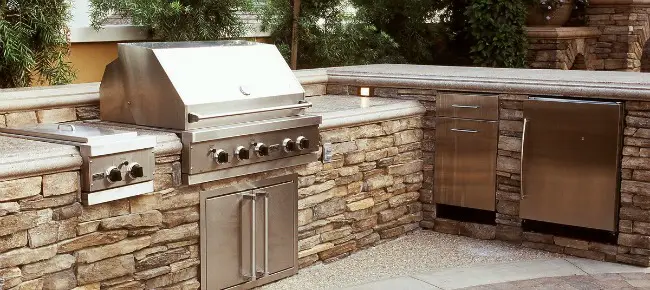 Concrete Outdoor Kitchen Countertops | photo: Concrete Network
Concrete Outdoor Kitchen Countertops | photo: Concrete NetworkThe problem with concrete outdoor kitchen countertops is the coloring which has a tendency to fade and turn yellow in the sun. This isn't as noticeable if you stick to lighter earth tone stains, do not add any coloring, or if the concrete countertop is completely shaded.
4. Epoxy Countertops
Another option is to apply a UV-resistant epoxy countertop coating over an existing concrete outdoor countertop or any other material. This is an inexpensive option to refresh any countertop that has been damaged, stained, aged badly, or simply lacks the style you prefer.
Outdoor epoxy countertops offer unlimited colors and patterns as you can create the design yourself! They are reasonably durable but not as stain-, heat-, or scratch-resistant as granite, quartzite, or other surfaces.
Just make sure the epoxy you use is UV stable in direct sunlight. Some epoxies will yellow outdoors. Otherwise it's a perfect DIY outdoor countertop material.
5. Soapstone Outdoor Countertops
Soapstone is a solid choice for outdoor kitchen countertops. Soapstone is highly resistant to heat and staining and will perform well. Note that it can be scratched rather easily. The good news is that scratches can be sanded out without much trouble.
One knock on soapstone is that when left unsealed or not oiled (neither of which are necessary for protection or maintenance) fingerprints, liquids, and oils will darken the stone.
They will eventually wash off, but the spots and splotches can be annoying.
Applying mineral oil will give soapstone that dark shine, but you have to apply it regularly to maintain that look.
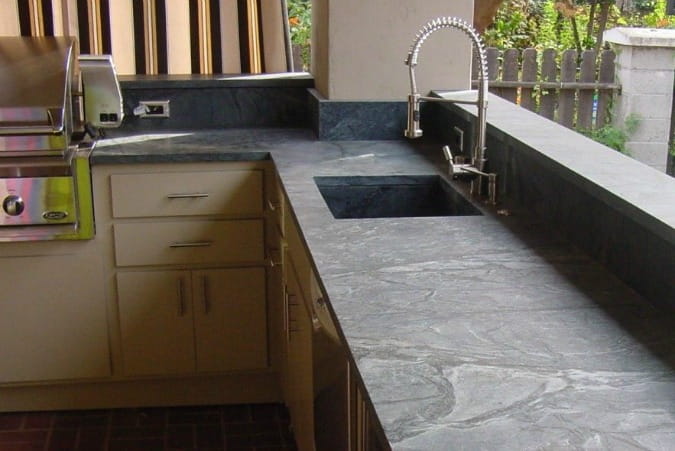 Soapstone Outdoor Counters | photo: Sierra Soapstone
Soapstone Outdoor Counters | photo: Sierra SoapstoneOne other consideration is the surface temperature. Being a dark natural stone it can get hotter to the touch than some light-colored materials, however it does dissipate heat well so it will not be scorching hot.
Soapstone outdoor countertops are a top choice for cold climates. Soapstone is non-porous and doesn't absorb water so it is much less prone to cracking in cold weather during freeze/thaw cycles.
Overall soapstone is a durable and relatively trouble-free surface for your outdoor space.
6. Porcelain Countertops
Porcelain is a highly durable, low-maintenance type of countertop that won't fade in the sun. All key characteristics for an outdoor kitchen countertop material.
Porcelain countertops won't etch or stain and don't need sealing. It is very scratch-resistant except to ceramic knives which may scratch. So don't use those! Chips can occur but they are rare. Any repair will be visible though.
7. Sintered Stone Ultra-Compact Surfaces
Dekton countertops are similar to porcelain but an upgraded material. Dekton is "sintered stone" also know as an "ultra-compact surface" which are exceptionally heat, scratch, and stain-resistant, and do not etch.
Neolith is another manufacturer. This countertop material combines elements of porcelain, glass, and quartz to improve durability.
The knock on porcelain and Dekton is that both are more difficult to fabricate and install so finding a fabricator can be difficult. But Dekton outdoor countertops are a solid option.
8. Marble Countertops
Marble countertops can work well for an outdoor kitchen, if you get a honed finish and don't worry about etching and staining too much. A honed finish is the way to go since rain, snow, wind, and general weather will wear away a shiny polished finish on a marble countertop.
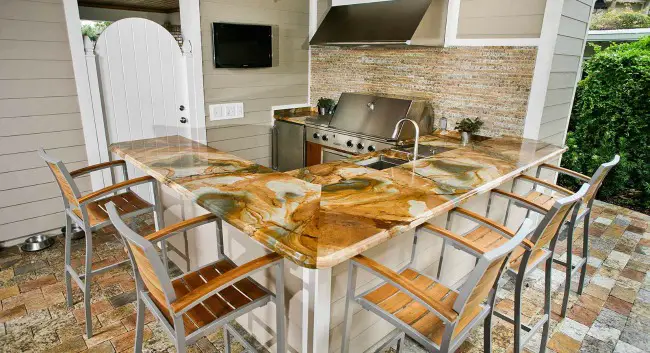 Exotic Marble Outdoor Countertops | Image credit: ADP Surfaces
Exotic Marble Outdoor Countertops | Image credit: ADP SurfacesAcidic foods and drinks like ketchup and pina coladas will cause etching (dull spots on the surface), so marble is not the best choice for a kitchen countertop inside or outside.
Stains (liquid absorbs creating a dark spot) can be controlled with a stone sealer.
Stains and etching can be managed and removed or repaired, but as a food prep surface you'll be dealing with these spots a lot. Deciding if that's okay with you or not is the key.
On the plus side, weather will also work for you by washing out stains and blending in etch marks aging the marble naturally for an authentic "rustic" look.
Marble is certainly durable enough and will last a long time so it's just a matter of how much maintenance you want to put into it to keep it looking new-ish.
If you let it age naturally, then it's almost maintenance-free. Normal clean-up is essentially all that is required for years of use.
All the above is true for travertine tile/slab and limestone outdoor countertops as well. Travertine, limestone, and marble all have the same performance qualities and maintenance requirements.
9. Glass Countertops
Glass countertops are an interesting choice for any kitchen as the custom design options surpass other surface types. Embedded shells, stones or other items, custom textures and patterns, and backlighting are all possible.
glass countertops can etch from acidic foods and drinks, though, so it may not be the best choice for an outdoor kitchen.
However, white glass countertops are more durable.
White glass is a specific type of glass countertop that is nearly stain-proof, does not etch, easy-to-clean and maintain and... cool to the touch which is helpful under a hot sun. White glass makes an excellent outdoor kitchen countertop.
10. Slate Countertops
Slate can be considered for outdoor kitchen countertops, but no two slates are alike and the performance characteristics can vary widely. Some varieties can be very durable and dense resisting staining and hard use, while others will stain, scratch, crack, and cleave.
And like soapstone the darker colored slate will result in a hot surface in direct sunlight.
So unless you can get some guarantees about the quality of the slate you intend to install, other choices are better. On the other hand, if you do get a high-quality slate slab, then no worries. It will give you years of enjoyment.
11. Outdoor Tile Countertops
Using tile for outdoor kitchen countertops involves a few other variables, but the tile material will have the same characteristics as a slab. Granite, travertine, ceramic, or porcelain tile are very durable and cheaper than a slab.
But tile countertops have grout that can get dirty and stain or break up, so it's not great from a maintenance standpoint for outdoor kitchens.
It will hold up reasonably well if not neglected. And tile is a cheap outdoor countertop.
For a complete discussion check out our page about using tile for outdoor countertops.
12. Lava Stone Countertops
Lava stone countertops are made from slabs of volcanic rock covered with a hard enamel coating.
This enamel coating comes in many colors from whites and grays to brilliant reds and yellows. The color will not fade from UV sunlight.
It is incredibly heat-resistant, does not need sealing, acid-resistant, and easy to clean and maintain.
Two Unusual Choices For Outdoor Countertops
13. Wood or Outdoor Butcher Block Countertops
Wood countertops and butcher block are sometimes considered for outdoor kitchen countertops. Many simply love the look. Of course, wood countertops will be high-maintenance and certainly not as durable as granite or other choices.
The important considerations are:
- "How long will it last?"
- "How difficult is it to maintain?"
- "Can it be made food safe and still protected from the elements?"
I'd suggest that you would need to frequently apply a food grade oil to the outdoor butcher block surface to both protect the wood from moisture and rot and allow for safe food prep.
Another option would be to varnish the surface like you might see on a bar top in a pub. A phenolic-based varnish could work. Good water repellent and UV protection, but requires a ton of regular upkeep. You'll have to sand and apply new coats probably every year.
You might consider Marine Spar Varnish for ultimate durability, but it tends to go on much darker and will continue to darken. Although, all varnish will yellow a bit with age.
A roof or something to shield from the elements will definitely help extend the life of this countertop material. Using a cover through the winter is probably a good idea.
If you are willing to put in the extra effort to protect and maintain it, then wood or butcher block can be used for outdoor kitchen countertops.
14. Stainless Steel Countertops
Stainless Steel is not often installed for outdoor use as countertops but can be a desirable option under the right circumstances.
Any surface can get hot if exposed to sun, but steel would be extreme. And very reflective too.
Now if the outdoor kitchen countertops will be covered or shaded or the temperature doesn't get too hot, then this is not an issue.
On the plus side, stainless steel presents easy clean up and maintenance although when constantly exposed to weather it still may show some wear.
Outdoor stainless steel countertops are expensive since they require skill to fabricate and not many can do it. Now maybe you can find an old stainless workbench from a restaurant or something like that may work for an outdoor kitchen.
Depending on your outdoor kitchen design and the size, you may be able to find an all-in-one stainless steel outdoor kitchen base that either rolls in or installs in components.
Stainless steel countertops are loud unless insulated somehow. Just setting a plate down can make an annoying sound.
Aesthetically stainless steel countertops have a much more utilitarian look to them but this works for a sleek or minimalist design.
Now I know stainless appliances have been on trend for years now, but that's a bit different than having a whole indoor or outdoor kitchen countertop. It could be a tad overwhelming... again depending on size and design.
Avoid These Countertop Materials Outdoors
The following types of countertops could be used for an outdoor kitchen, but they share have issue that really can't be remedied.
15. Corian Countertops
Corian solid surface is basically a plastic aggregate material so it may not retain or reflect heat or get as hot as other surfaces, but I wouldn't recommend using it for an outdoor kitchen.
The color can fade and get splotchy outdoors, although, some Corian colors may hold up better than others and last a long time. The color technology is improving to be more UV-resistant.
Corian is not heat resistant... no hot pots or setting anything hot on the surface. Poor heat-resistance can be a problem around a hot BBQ grill possibly resulting in damage. And it scratches fairly easily.
16. Quartz Countertops
Are Quartz countertops good for outdoor kitchens? No. Engineered quartz counters are also not a good pick for outdoor use.
The resin / coloring used to manufacture this surface will turn yellow in the sun and elements. Otherwise, it would be a good choice similar to granite. It's great for indoor kitchens but not an outdoor kitchen.
17. Laminate Countertops
Laminate is popular and an inexpensive choice for indoor kitchens but it has too many seams and the particle board base just cannot stand up to outdoor elements. It will absorb moisture, warp, and eventually just fall apart.
Also, the color of a laminate surface can fade over time in the sun.
Best Outdoor Kitchen Countertops for a Hot Climate
Granite countertops exposed all day to 90-degree sun will get very hot indeed. But guess what... so will any other type of stone or tile you might consider using... hot enough that you don't want to rest an arm on it.
Travertine and porcelain may even be worse than granite since they are more dense than granite and typically have a higher "thermal mass," which is the ability to absorb and transfer heat.
In this regard, Corian and butcher block countertops would likely not absorb as much heat or become hot to the touch. But neither are great for outdoor kitchens.
White glass countertops will be the least hot in direct sun and the best outdoor bar countertop for hot climates. But, of course, all surfaces are going to be hot unless shaded.
Regardless of the type of countertop material you go with, picking a lighter color will help reflect the sun's heat and be the cooler surface.
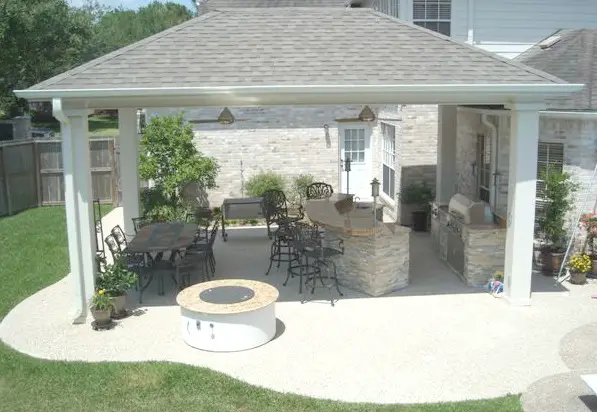
But the best way to deal with this issue is to build a roof or pergola over the outdoor kitchen countertops.
A pergola will likely provide enough shade to keep the countertop surface temperature reasonable. Also an outdoor fabric that filters the light but allows air passage could be attached to the top of the pergola for better shading.
In some cases, a short wall or row of plants or trees may do the trick to keep the sun off the countertop surface.
Best Outdoor Countertops for Cold Climates
Top outdoor countertop options for cold climates are:
- Porcelain
- Sintered Stone
- Soapstone
- Epoxy
- Granite & Quartzite (preferably sealed)
The problem for outdoor countertops in cold climates with many freeze and thaw cycles is water absorption. Absorbed water will expand when frozen and then contract when thawing. This process can lead to cracking in the countertop material.
Non-porous materials are best to stand up to winter weather. But you don't have to rule out natural stone. Even though most natural stone is porous it tends to withstand freeze and thaw cycles and cracks are rare.
Still it is best to seal stone to prevent water absorption and staining.
Also, you'll want to cover your outdoor kitchen to minimize moisture absorption and possible cracking during a freeze. This is not a common problem, but applies to all natural stone and ceramic and worth the small effort to avoid damage.
Outdoor Countertop Edges, Finishes & Slab Size
Edge Options
Edge options are more limited for outdoor kitchen countertops than for those indoors, but you still have many choices. It's only the complex laminated edges that you want to stay away from.
Laminated edges create an extra-thick edge profile by gluing a second strip of granite or marble (or whatever countertop material you have) to the underside of the slab. This is done mainly on the thinner 2 cm granite slabs.
The problem is the epoxy glue.
The epoxy used to laminate countertop edges to create a full bullnose, ogee, double-bevel or other "fancy" edge designs will degrade in the sun and eventually that laminated edge will come off.
Best Type of Finish
For the most part the choice of surface finish on outdoor kitchen countertops is a matter of personal preference, but here's a few considerations:
A flamed surface is not a great choice for a countertop simply because it is a rough surface that will be much harder to keep clean. A great look for walls and good traction for floors though.
A honed granite or marble finish is fine, but the color won't be as intense. However, it can still look stunning and many like a honed surface finish. Fingerprints do show up more on a dark-colored honed surface.
A polished surface is the most popular. A polished finish is very easy to keep clean and polishing will bring out the color and pattern of a natural stone countertops more than any other finish type.
However, the type of countertop material is a factor. A polished finish on granite outside isn't a problem. Granite is so hard it will stand up to a lot of wear and weather without affecting the finish.
Marble and other stone countertops do better with a honed finish outdoors. Rain, snow, wind and weather in general will eventually wear away a polished finish on a marble outdoor countertop.
One other factor to ponder that may or may not be an issue is the reflection and glare on a polished finish. This will be more severe than on a honed finish. However, if the kitchen area is covered or shaded, then it shouldn't be an issue.
Slab Thickness
Either a 2 cm (3/4 inch) slab or a 3 cm (1 1/4 inch) is fine to use for an outdoor kitchen countertop. The thinner 2 cm slab will need a little extra support, but it will be cheaper over-all.
A 3cm slab (vs. a 2cm) can still have a nice thick edge profile without laminating. A 2cm slab will have a thin edge without laminating (which you don't want to do outside).
The extra cost of the thicker 3 cm slab may not be worth it to you just for the edge, although, that is typically the main reason to install 3 cm granite countertops.
Outdoor Counter Height & Depth
The height and depth of an outdoor kitchen countertop or bar top will vary depending on the size of appliances, bar stool height, and the height of users.
- Standard outdoor counter height = 36"
- Required height with a refrigerator = 38"
- Height should not be higher than the bent elbow of the shortest user
- Outdoor countertop depth = 30" to accommodate a BBQ grill
- Standard outdoor bar top height = 40" to 42" depending on bar stool height
Conclusion
There you have it. For the best outdoor kitchen countertops, granite is the safest bet but not your only option. Several other countertop materials are solid performers outdoors too. And then a handful that really shouldn't be outdoor kitchen countertops.
To make the right choice consider your design desires, your climate, overall outdoor kitchen structure, availability of shade, and the time and effort you're willing to expend on maintenance.
Related Content:
- Outdoor Kitchen Design & Planning Guide
- 21 Ultimate Kitchen Countertop Guides
- How To Find The Best Countertop Fabricator
